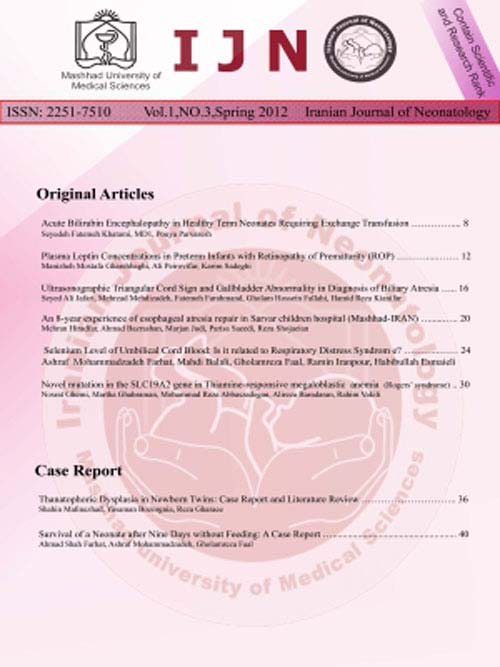Evaluating the Value of Quadruple Thyroid Screening in the Diagnosis of Hypothyroidism among Premature Neonates in Tehran in 2019-2020
Author(s):
Article Type:
Research/Original Article (دارای رتبه معتبر)
Abstract:
Background
Neonate screening is a preventative measure that can contribute to early diagnosis of treatable diseases. Hypothyroidism in neonates is among the common preventable factors leading to intellectual disability. This study aims to describe the prevalence and experience with four-step screening to diagnose congenital hypothyroidism.Methods
The statistical population of this cross-sectional study included 392 preterm neonates (gestational ages less than 36 weeks and 6 days) in 2018-2019 from the health centers covered by Shahid Beheshti University of Medical Sciences (Tehran, Iran) who had been referred for screening. Neonates were screened in the first 3-6 days after birth and then on days 14, 42, and 72. In neonates with TSH serum levels of 10 mU/L, TSH-T4 was measured. Next, the physician decided on the medication based on the results.Results
At the primary screening of the neonates average TSH level was 2.08 ± 2.4 mU/L. Thirty-three neonates (8.4%) indicated disrupted screening results. The secondary screening of 388 neonates (98.97%) revealed an average TSH serum level of 1.9 ± 1.96 mU/L, and 19 (5.9%) indicated TSH serum levels higher than 5 (mU/L). The third screening test was performed on 382 (97.44%) of the neonates. The average TSH level was 1.3 ± 2.4 mU/L, 340 (85.96%) indicated normal levels, and 42 (11.47%) had unfavorable results. Finally, the fourth screening test was performed on 373 (95.15%) neonates. The mean TSH level was 2.21 ± 1.9 mU/L, which revealed 24 (6.12%) unfavorable test results. The percentage of hypothyroidism in neonates was 5.6% (23 cases). In this study, the prevalence of hypothyroidism was 4.33% (17 cases) in girls and 1.53% (6 cases) in boys. Conclusion
The results of this study revealed the high incidence rate of congenital hypothyroidism among preterm neonates. Therefore, preventing congenital hypothyroidism misdiagnosis requires a series of screening tests. Also, findings indicated that the results of screening tests for preterm neonates with prolonged GAs and higher birth weights are more accurate and reliable.Keywords:
Language:
English
Published:
Iranian Journal of Neonatology, Volume:15 Issue: 1, Winter 2024
Pages:
21 to 26
https://magiran.com/p2655966


